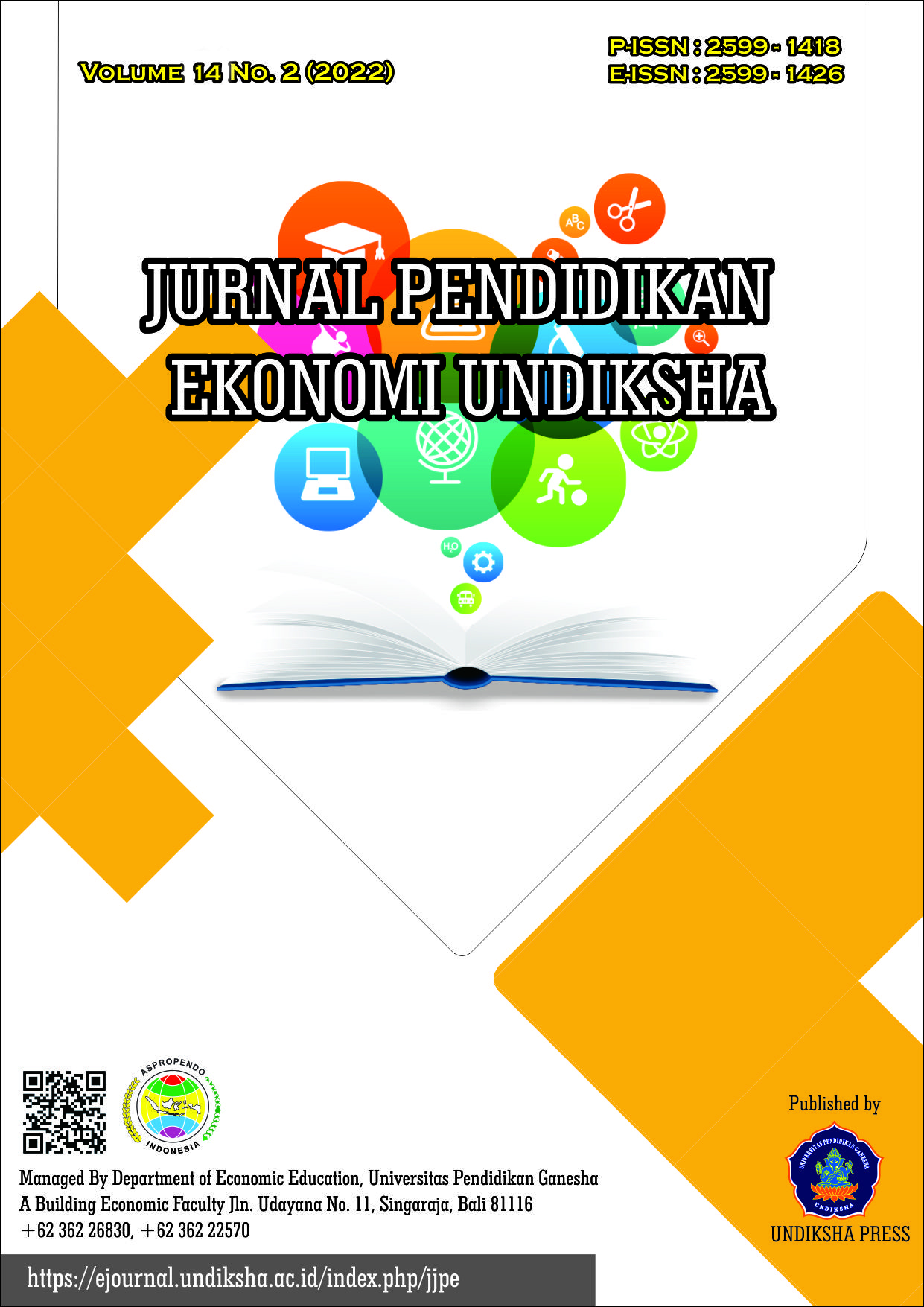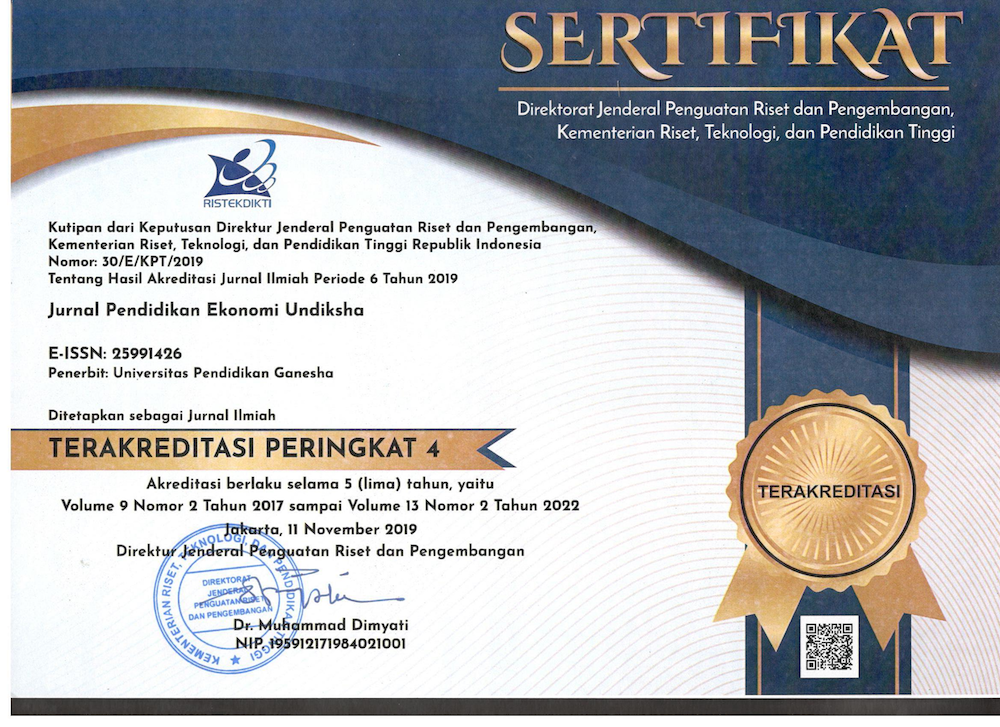Pengaruh Perilaku Belajar dan Penggunaan Google Classroom terhadap Hasil Belajar Mata Kuliah Entrepreneur 1 pada Mahasiswa Universitas Bhinneka PGRI
DOI:
https://doi.org/10.23887/jjpe.v14i2.52353Keywords:
Learning Behavior, Use of Google Classroom, Learning OutcomesAbstract
This study aims to determine the effect of learning behavior and the use of google classroom on the learning outcomes of the Entrepreneur 1 course for Bhinneka PGRI University students. This study uses a quantitative technique with a survey method with a population of 135 students, the researcher uses the Slovin formula with an error limit of 0.1 and the number of samples obtained is 58 students. The data analysis used is the research instrument test: validity test and reliability test, classical assumption test: normality test, linearity test, multicollinearity test and heteroscedasticity test, regression analysis: multiple linear regression analysis and coefficient of determination and hypothesis test: t test (test partial) and F test (simultaneous test) using the SPSS version 21 program. Based on the results of the study, the analysis of the coefficient of determination shows that the variables of learning behavior and the use of google classroom affect learning outcomes by 53.9%. And it was found that the variables of learning behavior and the use of google classroom partially have a significant relationship to learning outcomes. In addition, the variables of learning behavior and the use of google classroom simultaneously have a significant effect on learning outcomes.
References
Alfa, S., Joyce, L., & Sjendry, L. (2022). Analisis Segmentasi Demografi Dan Psikografi Pada Toko Raps Id Store. Jurnal EMBA, 10(1), 202–207.
Alie, J. (2022). Analisis Citra Merek dan Harga Terhadap Keputusan Pembelian Handphone Oppo di Pamlembang. Ekonomica Sharia: Jurnal Pemikiran Dan Pengembangan Ekonomi Syariah, 8(1), 75–82.
Bloom, B. S. (1956). Taxonomy Of Educational Objectives. In Cataloging and Classification Quarterly. Simultaneously In The Dominion Of Canada. https://doi.org/10.1300/J104v03n01_03
Hamzarudin, H., Dwi, S., & Eka, W. M. (2020). Utilization of Google Classroom-Based Learning Management System in Learning. Jurnal Pendidikan Fisika, 8(1), 78–86. https://doi.org/10.26618/jpf.v8i1.3019
Maulidya, N. S., & Nugraheni, E. A. (2021). Analisis Hasil Belajar Matematika Peserta Didik Ditinjau dari Self Confidence. Jurnal Cendekia : Jurnal Pendidikan Matematika, 5(3), 2584–2593. https://doi.org/10.31004/cendekia.v5i3.903
Mira, M., Beni, J., Anton, N., & Helman, M. (2021). Optimalisasi Penggunaan Google Classroom pada Pembelajaran Matematika di Masa Pandemi Covid 19. JMM (Jurnal Masyarakat Mandiri), 5(3), 836–846.
Neni, H. (2017). Metodologi Penelitian Pendidikan (edisi pert). CV. Media Akademi.
Novitasari, Y., & Fauziddin, M. (2022). Analisis Literasi Digital Tenaga Pendidik pada Pendidikan Anak Usia Dini. Jurnal Obsesi : Jurnal Pendidikan Anak Usia Dini, 6(4), 3570–3577. https://doi.org/10.31004/obsesi.v6i4.2333
Nugroho, P. I., & Cahyaningtyas, M. (2022). Pengaruh Kecerdasan Emosional, Kecerdasan Spiritual, Kecerdasan Sosial, Dan Perilaku Belajar Terhadap Tingkat Pemahaman Akuntansi. Ekuitas: Jurnal Pendidikan Ekonomi, 11(1), 81–90. https://doi.org/10.33592/pelita.vol19.iss2.121
Rahayu, S. W., & Novi, T. (2021). Analisis Motivasi Belajar dan Hasil Belajar Siswa di Masa Pandemi Covid-19. Prima Magistra: Jurnal Ilmiah Kependidikan, 2(1), 90–101. https://doi.org/10.37478/jpm.v2i1.878
Sabran, & Sabara, E. (2019). Keefektifan Google Classroom Sebagai Media Pembelajaran. Prosiding Seminar Nasional Lembaga Penelitian Universitas Negeri Makassar, 122–125. https://webcache.googleusercontent.com/search?q=cache:SS_jKM_r2TAJ:https://ojs.unm.ac.id/semnaslemlit/article/download/8256/4767+&cd=2&hl=id&ct=clnk&gl=id
Simanjuntak, H. (2020). Motivasi Belajar Mempengaruhi Terhadap Hasil Belajar Siswa Kelas V Di Sekolah Dasar (Studi Pada SDN 064021 Kecamatan Medan Helvetia Kota Medan). As-Syar’i: Jurnal Bimbingan & Konseling Keluarga, I(2), 149–157.
Sugiyono. (2013). Metode Penelitian Kuantitatif Kualitatif Dan R&D (Cetakan Ke). CV. ALFABETA.
Sutomo, M. (2019). Kajian Konseptual Kontribusi Gaya Belajar Terhadap Perilaku Belajar. Auladuna : Jurnal Prodi Pendidikan Guru Madrasah Ibtidaiyah, 1(2), 112–126. https://doi.org/10.36835/au.v1i2.236
Syafari, Y., & Montessori, M. (2021). Analisis Pembelajaran Daring Terhadap Motivasi Belajar dan Prestasi Belajar Siswa Dimasa Pandemi Covid-19. Jurnal Basicedu, 5(3), 1294–1303.
Downloads
Published
How to Cite
Issue
Section
License
Copyright (c) 2022 Jurnal Pendidikan Ekonomi Undiksha

This work is licensed under a Creative Commons Attribution-ShareAlike 4.0 International License.





